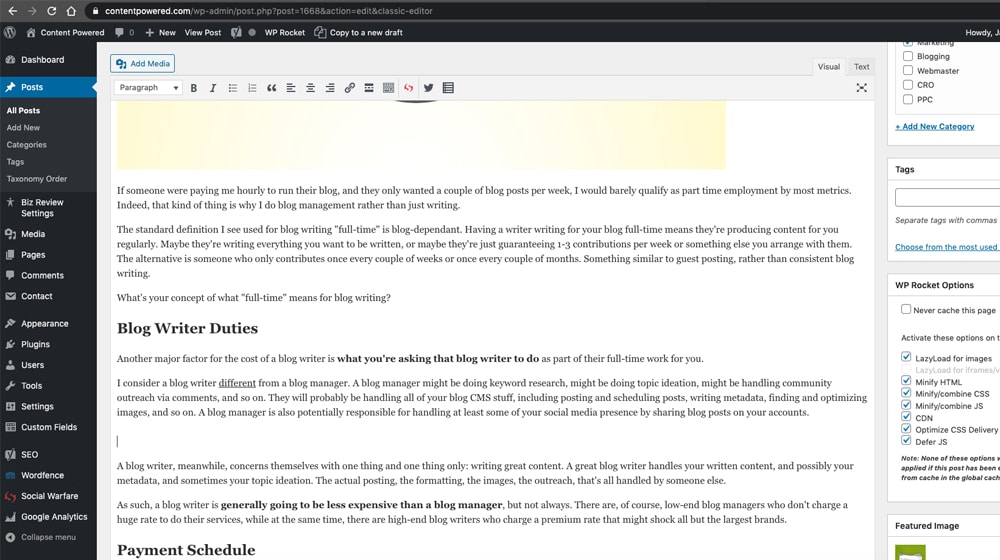What is The Average Salary of a Full Time Blog Writer?

Over the past few months, I've been writing a few different posts to give you an idea of how much it costs to run a blog. Looking into the financial side of things can give you a perspective of the value a blog writer, blog manager, or blogging company can bring to the table.
You can check out some of the older posts here.
- What's the Cost of an In-House Digital Marketing Team?
- How Much to Blog Management Services Cost on Average?
- Hiring a Blog Manager: Contractor, In-House, or DIY?
Today I'm going to look at another aspect of this scenario. Specifically, I want to talk about the cost of a full-time blog writer.
What Constitutes Full-Time?
The first question you need to answer when you're thinking about a full-time blog writer is "what, exactly, is full-time?"
There are a few different definitions of full-time you can use here. The first is the traditional employment definition. According to the United States Department of Labor and the Fair Labor Standards Act, there's no consistent definition.

The generally accepted level for "full-time employment" is typically 40 hours per week. If you're working five days a week, for eight hours a day, that's 40 hours a week, and that's what was typically considered a good career for many people in the decades past.
However, a company can determine what is full-time based on different metrics. I've seen companies consider 35 hours per week to be full-time, and I've even seen some companies that refuse to go over 25 hours per week because that turns a part-time employee into a full-time employee.
With a blog writer, though, things get a little different. If you're writing one blog post per week, and that blog post takes, oh, three hours to produce and fine-tune, "full-time" works out to be less than 15 hours per month. Obviously, you don't want to be paying a massive salary to someone who is barely working half a traditional shift per week.
Things get a little muddier when you consider that many blog writers are freelancers or contractors, not employees. You aren't likely to be paying them hourly, so much as paying them by the word or by the project. When payment is based on production, not based on billable hours, the writer is free to spend as much or as little time as they need (and as they deem reasonable) on the project.
I've been writing blog posts for half a decade now, and I've gotten it down to a pretty quick practice. A 1,000-word blog post might take me an hour or less. A 2,000-word blog post might take me an hour or two. However, longer posts, more complicated topics, or posts that require me to research them personally can take quite a bit longer. It very rarely takes me more than three hours to write a standard blog post, excluding marketing, formatting, optimization, images, and other blog manager topics. More on that in the next section.

If someone were paying me hourly to run their blog, and they only wanted a couple of blog posts per week, I would barely qualify as part time employment by most metrics. Indeed, that kind of thing is why I do blog management rather than just writing.
The standard definition I see used for blog writing "full-time" is blog-dependant. Having a writer writing for your blog full-time means they're producing content for you regularly. Maybe they're writing everything you want to be written, or maybe they're just guaranteeing 1-3 contributions per week or something else you arrange with them. The alternative is someone who only contributes once every couple of weeks or once every couple of months. Something similar to guest posting, rather than consistent blog writing.
What's your concept of what "full-time" means for blog writing?
Blog Writer Duties
Another major factor for the cost of a blog writer is what you're asking that blog writer to do as part of their full-time work for you.
I consider a blog writer different from a blog manager. A blog manager might be doing keyword research, might be doing topic ideation, might be handling community outreach via comments, and so on. They will probably be handling all of your blog CMS stuff, including posting and scheduling posts, writing metadata, finding and optimizing images, and so on. A blog manager is also potentially responsible for handling at least some of your social media presence by sharing blog posts on your accounts.

A blog writer, meanwhile, concerns themselves with one thing and one thing only: writing great content. A great blog writer handles your written content, and possibly your metadata, and sometimes your topic ideation. The actual posting, the formatting, the images, the outreach, that's all handled by someone else.
As such, a blog writer is generally going to be less expensive than a blog manager, but not always. There are, of course, low-end blog managers who don't charge a huge rate to do their services, while at the same time, there are high-end blog writers who charge a premium rate that might shock all but the largest brands.
Payment Schedule
One factor that goes into the average salary of a blog writer is how that writer is getting paid. There are a handful of different options, each with their own pros and cons.
First, you have the per-word rates. This is very common amongst blog writers, and with good reason. Every word counts, so they should be paid for every word. You see this on everything from high-end freelancers to low-end content mills.

Rates for per-word writing can vary wildly. I've seen low-quality content mills pumping out content for less than 1 cent per word, though frankly, that content sucks. Acceptable content from content mills might run you 5-10 cents per word, so a 1,000-word blog post would cost you $50-$100.
At the other end of the scale, I've personally talked to blog writers that get paid $1 per word or more. A 2,000-word blog post from one of these writers would cost you $2,000, which sounds extremely steep, but the quality of the content you get is insane. These writers have the skills to pay the bills.
The downside of the per-word rate system is that it doesn't factor time in at all. The lower the rate, the less the writer wants to spend on the piece because they have to consider an effective hourly rate. If they're getting paid $25 for a blog post and it takes them six hours to write that post, they're not making enough to survive. They'll prize speed over quality at low price rates, but at higher rates will be able to take longer and produce better content.
Second, you have per-project rates. Per-project rates tend to take over for larger projects or for very high-end freelancers. You might have something like "I'll pay $10,000 for this ebook." That sounds like a lot, and indeed if the ebook is 6,000 words long or so, it's over $1 per word.

People like this model because word counts tend to be more flexible. They can write what they need to write to suit the project, and it won't affect their pay. They don't need to fluff up a word count to earn more. It's also time-insensitive. If the blog writer has a month to write that $10,000 post, they can spend the full month working on it, or they can bust it out in a few days and spend the rest of their time working to make money from other sources.
Per-project rates are excellent for top-tier projects, and it's not uncommon to see $10,000 as the floor for a good project. Of course, you can also do per-project rates for smaller but more frequent projects, which is what I tend to do.
The third payment option is an hourly rate. You get this when you're working with freelancers who are used to regular employment rather than freelance writing, or when you're working through a platform like Freelancer or Upwork that offers it as an option.

Per-hour rates are interesting for writing because there's no real way to verify that work has been done for as long as the freelancer claims. Great freelance writers who really know their stuff might not take very long to write high-quality content, as well, which means that per-hour rates actively work against them unless they fluff up their time. Personally, I don't think it's a good option.
The fourth kind of payment method is your usual employment contract with a salary. You pay the writer X amount per week/month/year, and they produce all the writing you need them to do. Given that this tends to actually count as an employment relationship rather than a freelance relationship, the pure salary might be lower than what a freelancer could get doing the same work, but they get things like medical coverage, a 401k, or other benefits.
Each option has pros and cons, and part of it will depend on the volume of writing you need, the benefits you're willing to offer, and the consistency of your workload.
Blog Niche
The final factor that's important for blog writing is the niche. Most niches are pretty easy to write for. Sure, every niche has its important data, its basic facts, and so on. There's a barrier to entry, but it's not entirely difficult to learn enough to write competent content.
Some niches are more complex, more heavily regulated, or require specialized knowledge, and those tend to require a premium. For example, I would charge a premium for a client looking to write in a financial niche, because financial information is heavily regulated. Telling someone some advice pulled from a poor source could have dramatic financial consequences, and that's not something a random freelancer wants to be responsible for.

Medical is also another specialized niche. Medical advice gone wrong can actually kill people, so that's not an area that good writers want to mess around with without adequate compensation. It's also worthwhile to have writers who know what they're doing because Google has been starting to penalize medical information that's just wrong.
Of course, every niche has a range of depth. Extremely deep-dive technical content requires an expert to write, and an expert will expect to be paid accordingly.
Examples and Data
So what kind of salaries or compensation levels might a blog writer charge? Let's take a look at a few sources of data.
Textbroker is a content mill on the low end of usable, which I know because I've used them before. Pricing for content from them ranges from under 1 cent per word to 10 cents a word or higher. The trick is, you're not guaranteed to get the same writer every time unless you hire them directly, and then you have to pay that writer's rate, which can be very high if the writer is very good or swamped with work.

Writer Access is a higher quality content mill with pricing similar to, but higher than, Textbroker's. You can pay a membership or buy content on-demand, and you can, of course, pay higher rates for higher quality content.

Upwork is one of the foremost freelancer hubs for writers. Writing jobs here tend to be listed with hourly pricing, and in a quick scan of freelancers currently available, I see prices ranging from $20 per hour to $120 per hour. The cheaper rates may be consistent but lower quality, while the higher rates tend to have accolades and awards behind them.

Indeed is a job portal with salary data included as part of their platform. According to their information, the average compensation level offered for various writing positions ranges from $15 to $25 per hour. Remember, though, that the people hiring writers on Indeed tend to be small businesses with consistent needs, so while the rates are lower, the number of hours billed are higher.

PayScale is another salary aggregator, and they have different information for different kinds of writers. Content writers are paid an average salary of about $45,000 per year, but the higher end reaches as high as $70,000 per year.

Glassdoor, similarly, has salary-based information. For blog writers, they list $33,000 on the low end, $51,000 as the average base pay, and $81,000 at the high-end, with additional compensation and benefits on top of that.

And, of course, you have all of the testimonials from bloggers themselves. I know writers who make $30,000 per year from freelance projects. I know bloggers making $65,000 per year working for a few select, consistent clients. I know bloggers running their own sites, attracting high-end clients, making $200,000 per year or more. A lot of it depends on how effective the writer is at promoting themselves and attracting high-end clients.
How much are you willing to pay your writers? I hope it's a reasonable amount; it's difficult enough to make a living these days without businesses under-paying for a valuable service. Let us know in the comments section!










May 24, 2020
Glad I found this before applying to writer jobs!
May 30, 2020
Hey Ernie! Glad it was helpful, you can definitely use average salary figures like this when negotiating to get a better salary with a potential employer. Writer jobs are all over the place, of course, so if you can specialize in a specific type of writing or a certain industry, your pay may be a bit higher than a general copywriter. Good luck with the job search!
March 25, 2021
Do you think $50 per article is fair?
March 25, 2021
Hi Rakesh!
That's pretty low for a quality article. I'd recommend paying your writers more and publishing less content for better results. Give your writer a handful of test assignments with detailed instructions and evaluate carefully to see if they'll work out for you. It's not uncommon to go through a few writers before finding a writer that works for them.
This article may come in handy to you as well:
September 06, 2022
How much do you pay for test articles?
October 07, 2022
Hi Ellen!
It varies on the word count and the assignment.
Usually, we give smaller test assignments before hiring a new writer. When hiring, we have many different writers handling various tests simultaneously. So we'll start with smaller tests to pre-qualify them, then ramp up to real-world assignments.